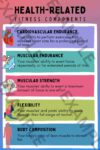
What Is The Difference Between Health And Skill Related Fitness

What Is The Difference Between Health And Skill Related Fitness?
When it comes to physical fitness, understanding its different components is essential to achieving your wellness and performance goals. Two broad categories often discussed in fitness literature are health related fitness and skill related fitness. While both are crucial for a balanced and active lifestyle, they serve different purposes and focus on distinct abilities.
In this article, we will dive deep into understanding the difference between health and skill related fitness, explore their key components, benefits, and provide practical tips to help you optimize both in your fitness journey.
What Is Health Related Fitness?
Health related fitness concerns the physical attributes that contribute directly to overall health and functional well-being. This type of fitness focuses on improving the efficiency of your body systems and reducing the risk of chronic diseases such as heart disease, diabetes, and obesity.
Key Components of Health Related Fitness
- Cardiovascular Endurance: The ability of your heart, lungs, and blood vessels to supply oxygen efficiently during sustained physical activity.
- Muscular Strength: The amount of force your muscles can exert in a single effort.
- Muscular Endurance: The ability of muscles to perform repeated contractions over time without fatigue.
- Flexibility: The range of motion available at your joints.
- Body Composition: The relative proportion of fat and lean mass in your body.
What Is Skill Related Fitness?
Skill related fitness focuses on the physical abilities that enhance athletic performance and the quality of movement during specific activities. These fitness components are crucial for sports, recreation, and everyday tasks requiring coordination and quick responses.
Key Components of Skill Related Fitness
- Agility: The ability to quickly change body direction and position efficiently.
- Balance: The ability to maintain body stability, whether static or dynamic.
- Coordination: The ability to use different body parts together smoothly and efficiently.
- Power: The ability to exert maximum force in the shortest time.
- Reaction Time: The speed at which you respond to a stimulus.
- Speed: The ability to move quickly from one point to another.
Comparing Health Related Fitness vs Skill Related Fitness
To better understand, let’s compare the two fitness types side by side.
| Fitness Aspect | Health Related Fitness | Skill Related Fitness |
|---|---|---|
| Primary Goal | Improve overall health and prevent diseases | Enhance sports performance and motor skills |
| Focus Areas | Endurance, strength, flexibility, body composition | Agility, balance, coordination, power, reaction time, speed |
| Target Audience | Everyone seeking better health | Athletes and those improving movement skills |
| Training Approach | Continuous, moderate-to-high intensity exercises | Drills, plyometrics, sport-specific practice |
| Measurement | VO2 max, BMI, flexibility tests | Agility tests, reaction time drills, speed sprints |
Benefits of Understanding Both Fitness Types
Recognizing the distinction between health and skill related fitness empowers you to design a well-rounded fitness plan that targets all essential components for a balanced lifestyle.
- Improved Health: Prioritizing health related fitness can reduce risks of cardiovascular diseases and improve longevity.
- Enhanced Athletic Performance: Skill related fitness improves coordination, agility, and quickness, which are crucial for sports and physical challenges.
- Functional Everyday Movement: Both types together foster better mobility and reduce injury risk in daily activities.
- Motivation & Enjoyment: Mixing workout types keeps training exciting and targets diverse fitness goals.
Practical Tips to Enhance Both Health and Skill Related Fitness
Incorporate these strategies into your workout routine to build comprehensive fitness:
- Combine Aerobic & Anaerobic Exercises: Mix running, swimming, and cycling with sprinting or jumping drills.
- Include Flexibility Work: Yoga or dynamic stretching benefits both health and skill aspects.
- Practice Sport-Specific Drills: If you play a sport, incorporate skill-related drills like ladder drills for agility or reaction time exercises.
- Strength Training: Use weights or bodyweight exercises to enhance muscular strength and power.
- Balance Training: Use balance boards or perform single-leg exercises to improve stability.
- Monitor Progress: Regularly test your endurance, flexibility, speed, and agility to stay on track.
Real-Life Case Study: Balancing Health and Skill Related Fitness
Meet Sarah, a Recreational Soccer Player:
Sarah wanted to improve her health while getting better at soccer. She combined strength and cardio workouts to enhance her cardiovascular endurance and muscle strength (health related fitness). To improve her on-field performance, she included skill related exercises like agility ladders, reaction drills, and balance training.
After 6 months, Sarah noticed she had more stamina during games, reacted faster to opponents, and decreased her injury rate. This balance not only improved her fitness but also her confidence and enjoyment of the sport.
Conclusion
Understanding the difference between health and skill related fitness is fundamental for anyone committed to improving their physical performance and overall well-being. Health related fitness ensures your body is strong, flexible, and capable of sustaining daily activities and good health. Skill related fitness sharpens your athletic attributes, enabling quick, precise, and powerful movements for sports and specialized physical tasks.
Incorporating elements from both fitness types will help you build a balanced, effective workout plan that supports your lifestyle goals, whether you’re focused on longevity, athletic achievement, or general fitness.
Start today by identifying which areas you want to improve and tailor your exercises accordingly. A blend of health and skill related fitness training is not just smart-it’s essential!






